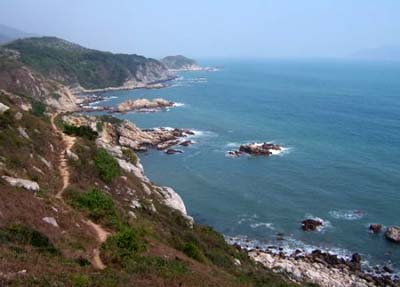| Home / Environment / Photo News | Tools: Save | Print | E-mail | Most Read |
| Sea to 'Engulf Guangdong' by 2050 |
| Adjust font size: |
The sea level along the coast of south China's Guangdong Province is forecast to rise by at least 30 cm by 2050, a weather report has said. Released by the Guangdong provincial weather authority, the report also forecast that some 1,153 sq km of coastal land in the Pearl River Delta (PRD) area will be engulfed by the middle of the century, with Guangzhou, Zhuhai and Foshan worst affected.
The PRD area, a leading manufacturing hub will be hard hit by climate change in the coming decades, Du Raodong, a weather expert with the Guangdong provincial weather center, said. "Climate change will negatively affect the economic development of Guangdong, which is currently one of the biggest consumers of energy and producers of greenhouse gases," Du told China Daily yesterday. The rising sea level will lead to a salt tide, which will pose a huge threat to the drinking water supply in the PRD, he said. "Moreover, more red tides (caused by high concentrations of algae) will occur along coastal areas, affecting agricultural production," Du said. According to the report, the temperature in the PRD region has risen by an average of 0.3 C per decade over the past 50 years, higher than the national level of 0.21 C. It also predicts the temperature in Guangdong will rise by 2.8 C by 2100. Du gave two key factors for Guangdong's worsening climate situation. "The rising temperature is a global issue. It is caused by the greenhouse effect," he said. The second, he said, was a result of rapid urbanization. "The province has claimed too many land resources during its urbanization process. And as a leading manufacturing hub in south China, Guangdong has attracted thousands of migrant people and produced many industrial pollutants as well," Du said. Yu Yong, director of the Guangdong provincial weather bureau, said global warming will bring about more abnormal weather conditions, such as drought and floods. "Severe drought and floods have hit the province in the past few years, causing large economic losses," Yu said. Du said provincial authorities should draw up more effective measures to combat the worsening climate situation. "For example, more energy-saving industrial facilities should be introduced, in a bid to reduce greenhouse gas emissions," Du said. (China Daily August 30, 2007) |
| Tools: Save | Print | E-mail | Most Read |
 |
| Related Stories |

